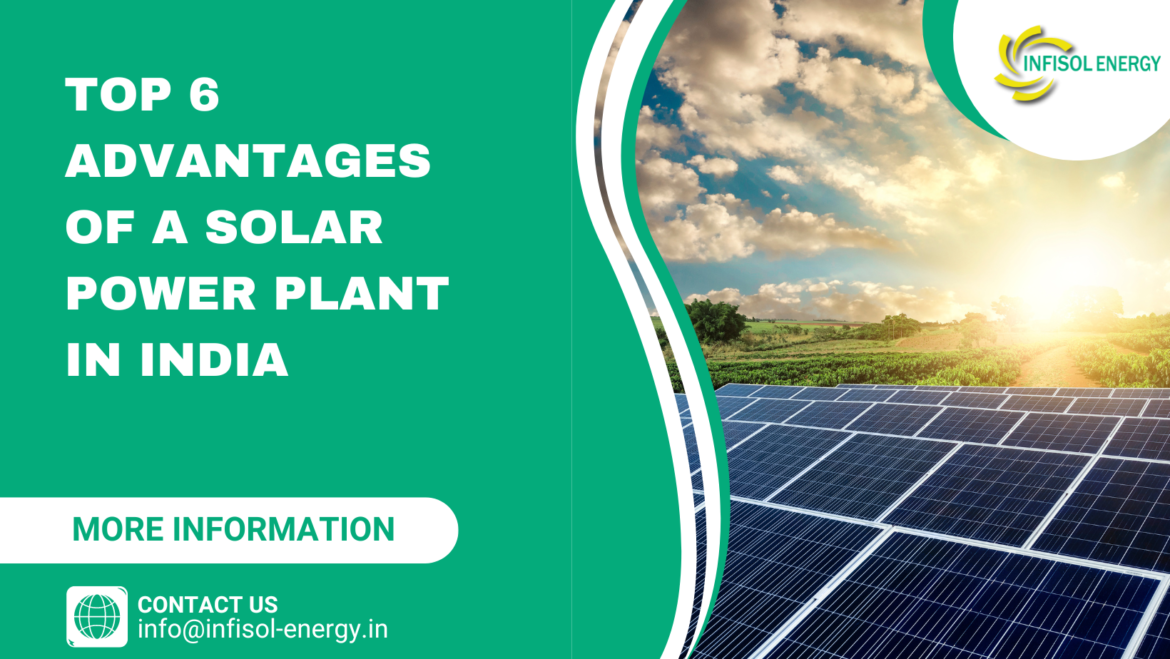The world is facing a lot of challenges due to climate change. To negate them, renewable energy sources, like Solar, play a vital role. It harvests energy from natural sources, like sunlight, and converts it into electrical power. Let’s explore a few major advantages of solar power plant as the primary factor contributing to the Indian energy ecosystem.
What is a Solar Power Plant?
It is a system that converts energy from sunlight into electricity to fulfill daily needs. Energy from the sun is the most abundant and cleanest renewable energy resource available worldwide including Maharashtra. From small homes to widely spread factories, it is possible to install solar power plants of any size and at any location depending on feasibility.
These solar plants use photovoltaic panels to absorb energy and convert it to electrical power. For this process, multiple solar panels are connected in the form of an array. These solar arrays are connected to inverters to generate final output.
Top Advantages of Solar Power Plants in India
The Solar power plant can benefit you in many ways. Let’s explore a few key benefits below.
Form of Renewable Energy
Primarily, solar energy is a renewable source of electrical power. It will never end like thermal, and other forms of energy. You can access anytime anywhere using solar panels.
Gives Energy Security
It is not possible to purchase sunlight and create a monopoly. Hence, it gives an advantage over other sources. Furthermore, it is easily accessible. Hence, the government is also actively developing solar energy infrastructure and giving various schemes.
Reduced Carbon Emission
Energy sources, like thermal, and nuclear release carbon dioxide and other harmful gasses while generating electrical energy. This gas is responsible for global warming. However, if you start using solar energy to generate electricity you will contribute to a reduction in carbon footprint.
Low Maintenance Costs
Since solar panel-based energy is generated in static form, the requirement for maintenance is relatively less. Moreover, the life of a solar panel is around 25 years, and that of an inverter is around 5 to 10 years. Hence costs lower amount to complete maintenance.
Reduce Electricity Bills and Tariffs
Once you install a solar power plant on a building, it will generate electricity, and feed it into the grid. If your solar system generates more power than consumption, your electricity bill will be reduced. Sometimes, you may not need to pay any bill. Further, if you have installed solar systems for industrial purposes, you will save on increasing tariffs.
One Time Investment
Solar energy is freely available to use. Therefore, there is no fuel cost involved. Hence, whatever investment of cost occurs in a solar system is the initial cost to install the system. After that, you don’t have to pay anything apart from system maintenance.
Conclusion
There are many more advantages of having a solar power plant. Do you want to utilize these advantages of solar energy and be part of a sustainable future? Contact Infisol Energy today, and learn more about how we can help you with solar panel installation services for your home, business, and commercial buildings.
FAQs
What are the financial incentives available for installing a solar power plant in India?
There are different types of financial benefits to installing solar systems. Depending on the type of system you have, you will get subsidy, or tax benefits as per active government schemes.
How does solar power contribute to India’s energy security and independence?
Solar energy is a free source of energy that is publicly available in unlimited amounts. Hence, you can not purchase it and create a monopoly business. This is how solar energy contributes to energy security.
What are the environmental benefits of switching to solar power in India?
Switching to solar power in India, you will start reducing your carbon footprint. It will contribute to protecting the environment from pollution.
Can solar power plants in India operate efficiently during cloudy or rainy weather conditions?
Solar panels generate electricity depending on the intensity of solar rays. In cloudy conditions, the system will generate electricity, but not at full potential. It will depend on the intensity of sunlight.

